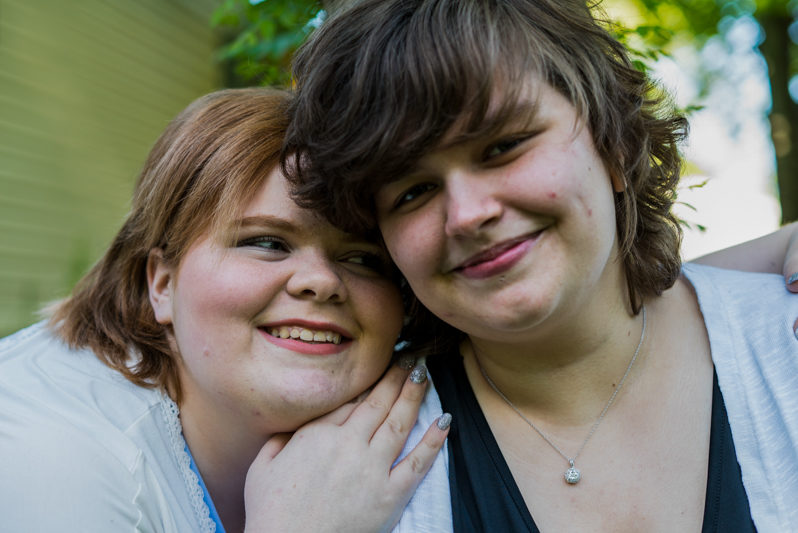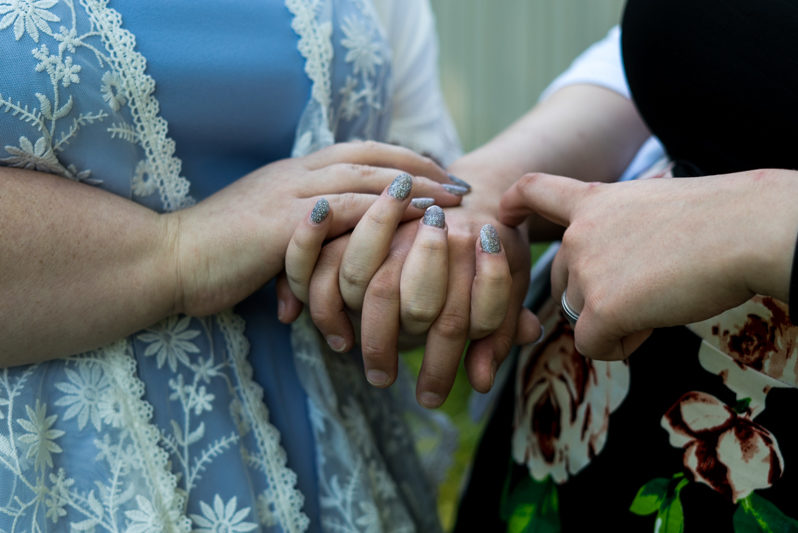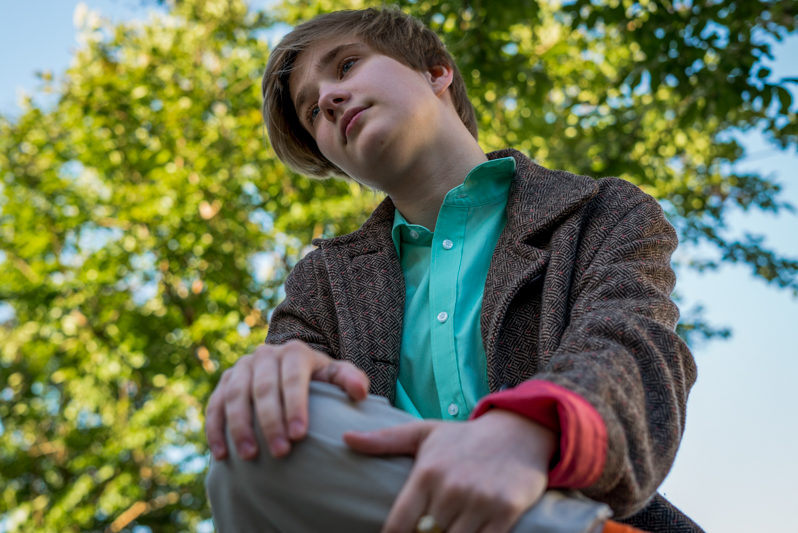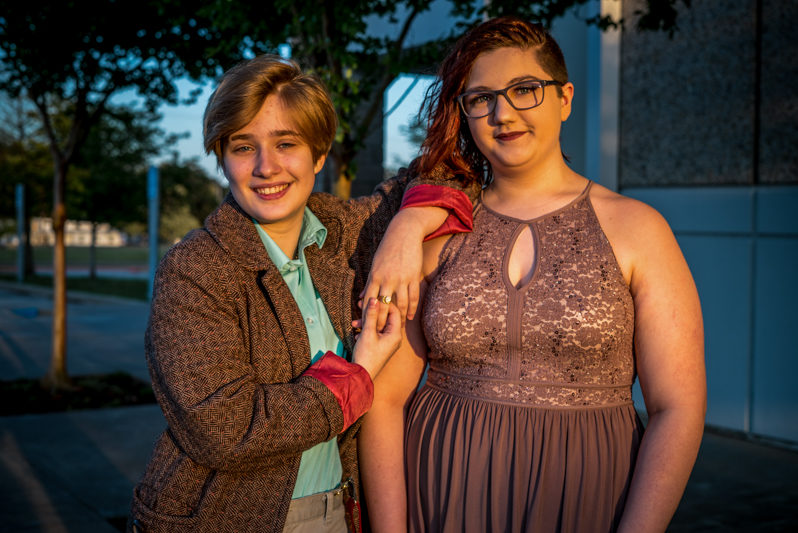‘In a Small Town Like This,’ Prom Draws East Texas LGBT Students
By Vicky Camarillo
Photography By Andrea Garcia
Reporting Texas

Central Heights High School senior Kai Martin attended the Lavender Prom in Nacogdoches, Texas, with their significant other, Brianna Bryant.
NACOGDOCHES — Kai Martin wasn’t much of a dancer. The high school senior had never been to prom or even homecoming. But on a recent night in April, Martin, who is agender and pansexual and prefers gender-neutral pronouns, was looking forward to holding hands with their significant other, Brianna Bryant, without fear.
Their best friend, Jason Couch, donned a mint green button-down shirt, khakis with red suspenders, a long brown suit jacket with red cuffs and socks bearing Edvard Munch’s famous painting, “The Scream.” It was an outfit that Couch was proud of and described as “sort of Duckie Dale,” referring to a character in the 1980s movie “Pretty in Pink.” Couch, a transgender boy, was ready for a fun night with his friends where he could simply be himself.
That night, April 14, was the Lavender Prom, open to LGBT students. LGBT proms have been held in Illinois, Michigan, Oregon and Colorado, but they’ve begun trickling into Southern states as well. In Texas, such events have been held in Dallas and Austin. But in cities like Nacogdoches, which sits in deep East Texas and has a population of 33,000, LGBT-centered events have been less common. And this prom, which was created last year after a Central Heights High School senior was told she could not take a girl as her date, was back by popular demand. About 75 high schoolers attended the event.
Martin and Couch, both 18, said life at Central Heights could be hard for some students who face bullying and isolation at their school — a school of about 330 students where a copy of the Bible is buried under the front steps, where district administrators canceled prom instead of addressing accusations of discrimination — and intolerance from their own families at times. But during this prom, they could leave those fears behind, at least for a few hours.
“Going to Lavender Prom is going to be a big step for me,” Martin said before the event. “I’m looking forward to just being around a bunch of accepting people and knowing that I’m in a safe place, and I can be who I want to be.”
The Prom

Students mingle at the Lavender Prom, in Nacogdoches, Texas, an event for LGBT students.
In spring 2016, Taylor Ries, then a Central Heights senior, signed up for her school prom and attempted to list a female classmate as her date. But she was told that, per the student handbook, students must either go “stag” or take a date of the opposite sex.
That same day, Ries contacted the American Civil Liberties Union, which sent a letter to the school district warning that the organization would take legal action if discrimination continued.
But because it was only two weeks before prom, it was too late for the ACLU to intervene by the time Ries graduated. So the controversy died down, and Ries attended the prom with her female classmate by employing a loophole: Her date signed up to attend the prom with “a random guy that agreed to do it for us,” Ries, now 20, said. The two girls were able to enjoy the prom together.
Couch recalled that in the fall, Central Heights students were sitting in their fourth-period classes when the principal announced via the intercom that the school would no longer be hosting a sponsored prom. In a 2016 interview with area news station KTRE, Central Heights ISD Superintendent Bryan Lee cited “increasing pressure, liabilities, and safety concerns” for the cancellation. All language related to the prom was removed from the student handbook. Lee did not respond to requests for an interview.
By then, Ries had graduated, but she still got wind of the students’ outrage, much of which was directed at her.
“At that point in my life, I just did not care,” Ries said. “I bet I would’ve when I was younger, and that’s why I thought it was important to do it at my age, because no one else would’ve. I just hated that the younger students were going to get the backlash because of me.”
Students’ parents banded together to fund and host their own prom. Meanwhile, Nacogdoches LGBT groups, led by CC Conn, a theater professor at Nacogdoches’ Stephen F. Austin State University, did the same. The first edition of the Lavender Prom was held in 2017.
It wasn’t intended to be an annual event, said one of the organizers, Grant Howarth. The intention was to make the school district “take responsibility and create that space for the students.” But the higher-than-expected turnout of 75 students and positive feedback prompted another go-round, and organizers hope to keep it going in the future.
“We need to show (the students) that as a community we support them and that they are not going through life alone,” Howarth said. “Now we’re just in it for the students, not necessarily to teach anyone a lesson.”
Coming Out

High school senior Kai Martin and their significant other, Brianna Bryant, first connected through a pen pal web site.
The day of the prom was windy and unseasonably chilly, but the overcast morning gave way to a cloudless afternoon. The sun lit up the multitude of trees surrounding the small mobile home park where Martin lives with their older sister. Martin and Bryant emerged from the home fully dressed and ready for the evening — Martin in a long lavender gown with a white floral shawl and white wedge heels, and Bryant in a black dress with a red floral design on the skirt. Bryant, having conceded to Martin’s request that they wear a dress, had just bought their outfit just hours prior, and it was Martin’s first time wearing heels.
It was, after all, a special night. Bryant, 18, had flown in from their home state of Oklahoma for the occasion. The two had been planning this get-together since January, when they first connected through a pen pal website.
Martin had turned to the internet to meet someone new because it was hard to do “in a small town like this.” Martin and Bryant — who is asexual and, like Martin, agender, preferring gender-neutral pronouns — began emailing, which Martin admitted was awkward. So they started using Snapchat instead.
“I thought they were annoying at first, I’m gonna be honest,” Martin said of Bryant. “But then I gradually started to like them, I guess. And then it went from there.”
Martin was about 12 when they first realized, “Oh, man. I don’t like boys.” All Martin’s life, they had gone to church with their family, let their hair grow long and worn dresses. But at 15, Martin got a smartphone and was introduced to social media, where they found other people like them.
“I guess you could say that social media influenced how I saw myself,” Martin said. “I didn’t want to accept it, but then around the age of 15, I did. And then I got out of church and started wearing pants and cut my hair really short.
“That was a big change. But I like it.”
But soon afterward, Martin’s relationship with their parents went south. One day Martin’s father found phone texts that referenced Martin’s sexuality and gender. After he stormed into Martin’s room and yelled, they began to consider moving out. That was about two years ago, and Martin moved in with their sister, Jessica, in March.
Bryant said they’ve come out to friends but are “terrified” to come out to their family.
“Gays just find each other,” Bryant said with a laugh. “So I am very open about my gender and my sexuality to them. But to my family, I am just a cishet white girl, loving Jesus.”
Cishet refers to someone who is both cisgender, meaning that person identifies as his or her assigned-at-birth gender, and heterosexual.
Martin agreed that, as a person growing up in the South, they often felt isolated and judged.
Martin prefers they/them pronouns but is resigned to the fact that many people will continue to misgender them. Meanwhile, Couch’s peers have told him he will never truly be a man, and bullies have been singling him out in recent months.
And although complaints about the canceled prom dwindled with time, “I know it’s on their minds,” Martin said. “Like, ‘Oh, those little LGBTQ, they’re the reason we can’t have prom anymore.’ That’s what I heard all the time … when it was really big.”
But having a contingent of queer friends in school has helped, Martin and Couch said. Martin, Couch and Ries became friends through the school’s theater program. Ries was the troupe’s stage manager when Martin and Couch were freshmen; Martin is now stage manager, and Couch aspires to become a film actor.

Central Heights High School senior Jason Couch’s experience as a trans person has been a “roller coaster,” he said.
Couch discovered he was trans around the age of 13. One day, he was watching a video he’d filmed of himself playing the ukulele. His hair was cut short in the video, and he thought, “What do you know? I think that I’m a guy, actually.”
His experience has been a “roller coaster,” he said. Sometimes he feels good about his gender identity, and other days, not so much, depending on how others treat him.
“Many people at my school are as intolerant as the people who run it and sort of grow up listening to what their parents say instead of exposing themselves to different things, and that really affects how I feel about myself, being surrounded by intolerance,” Couch said.
Couch, an only child, said his parents’ acceptance of his gender has come in peaks and troughs. At first, they seemed open to the idea of having a son, but after some time passed, they became “spiteful” about it, he said.
But now they seem to have mellowed out. Couch’s father recently showed him around Stephen F. Austin State University, where Couch plans to enroll.
“And he was like, ‘Oh, you’re gonna be the big man on campus,’” Couch said. “He gave me a Swiss Army knife the other day and was like, ‘Every man should have a pocket knife.’ Little things like that really help.”
Martin hopes that the attitudes among students at Central Heights will eventually change. Martin recently spoke to a group of incoming high schoolers about the theater program and felt that the students shared an inclusive attitude.
“I was very open about what theater is — the culture and what we do and how accepting we are. I feel like there were a lot of students that were very accepting and very welcoming of the LGBT community.”
Prom Night

Central Heights High School senior Jason Couch with freshman prom date Ella Dodge attended the Lavender Prom recently in Nacogdoches, Texas.
Around 7 p.m., students in all their finery — gowns, heels, suit jackets in all colors — entered the Nacogdoches County Exposition Center.
As Couch waited outside, his ringtone, “It’s Gonna Be Me” by NSYNC, went off. It was his date, Ella Dodge, a Central Heights freshman, letting him know her mother’s car was pulling up to the entrance.
The Expo Center is a big, impressive-looking building right off a major highway, and it was a step up from the previous year, Couch said. The inaugural Lavender Prom had been held in a university space about the size of a classroom.
After snapping a photo of the students, Ella’s mother gave her a hug and told her to have fun. Couch and Dodge entered the building as “New Rules” by Dua Lipa blasted from the outdoor speakers.
Inside, past silver streamers and through a white archway threaded with twinkle lights, Couch met up with Martin, Bryant and other friends. They chatted and laughed near a photo backdrop, complete with a table of goofy hats and racks of gaudy jackets for students to take their requisite prom portraits. The group clustered together for a photo taken with a selfie stick.
Purple lights illuminated the walls, and multicolored Japanese lanterns hung from the ceiling. At the other end of the room, cheers and laughter arose as a dance battle broke out.
It was just another prom.
“When I have kids,” Couch said, “I’m gonna be like, ‘I witnessed it. I saw it happen. I was friends with the person who helped make it.’ Tell them about what it’s like to be a trans kid in East Texas in the 2010s.”